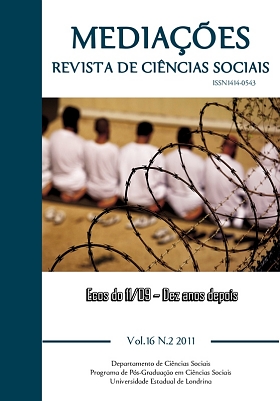Political culture, the dimensions of exercising citizenship and the participation in public life
DOI:
https://doi.org/10.5433/2176-6665.2011v16n2p228Keywords:
Citizenship, Politic participation, Democratic valuesAbstract
The aim of this paper is to think about the elements of exercising citizenship, of political culture and of subjective values that influence political phenomena. The relationship between cultural values and political dynamics still constitutes a controversial issue among political scientists, yet, increasing links between the variables can be perceived. Authors such as Putnam (2000) and Moses (2010) emphasize the importance of the attitudes of the citizenry. The analysis is based on data collected by a survey (2010) conducted with the population of three cities that constitute the so-called urban sprawl of the Metropolitan Region of Maringá: Sarandi, Paiçandu and Maringá. Classical themes were presented in researches on political culture, as well as controversial issues such as the decriminalization of marijuana, the legalization of abortion, among others.Downloads
References
CABRAL, Manuel Villaverde; SILVA, Felipe Carreira. O "efeito metrópole" sobre o exercício da cidadania política. 2006. mimeo.
CLARK, Terry; HOFFMAN-MARTINOT, Vincent. The new political culture. Boulder, Colo: Westview Press, 1998.
DOIMO, Ana Maria. Pluralidade religiosa à brasileira, associativismo e movimentos sociais em São Paulo. In AVRITZER, Leonardo (org.). A participação em São Paulo. São Paulo: UNESP, 2004. p. 123-196.
FEDOZZI, Luciano. Orçamento participativo: reflexões sobre a experiência de Porto Alegre Porto Alegre: Tomo Editorial, 1997.
GUTTIMACHER INSTITUT. Long-term decline in U.S. abortions has stalled; provider harassment has increased. Disponível em: www.guttimacherinstitut.org/sections/abortion.php Acesso em: 12 jan. 2011.
HELD, David. Modelos de democracia. Belo Horizonte: Paidéia, 1997.
INGLEHART, Ronald. The renaissance of political culture. American Political Science Review, Baltimore, v. 82, n. 4, p. 1203-1230, 1998.
KRISCHKE, Paulo. Aprendendo a democracia na América Latina: atores sociais e mudança cultural. Porto Alegre: EDPUCRS, 2004.
MENEGUELLO, Raquel. Aspectos do desempenho democrático: estudo sobre a adesão à democracia e avaliação do regime. In: MOISÉS, José. A. (org.). Democracia e confiança: por que os cidadãos desconfiam das instituições públicas? São Paulo: EDUSP, 2010. p. 123-148.
MOISÉS, José Álvaro. Cultura política, instituições e democracia: lições da experiência brasileira. In: MOISÉS, José. A. (org.). Democracia e confiança: por que os cidadãos desconfiam das instituições públicas? São Paulo: EDUSP, 2010. p. 77-122.
MOUFFE, Chantal. O regresso do político. Lisboa: Gradiva, 1996.
OBSERVATÓRIO DAS METRÓPOLES. Desigualdades Socioespaciais, Cidadania e Governança Urbana - A Região Metropolitana de Maringá. Universidade Estadual de Maringá, Relatório de Pesquisa, 2010.
PATEMAN, Carole. Participação e teoria democrática. São Paulo: Paz e Terra, 1992.
PROGRAMA DAS NAÇÕES UNIDAS PARA O DESENVOLVIMENTO - PNUD. Relatório a democracia na América Latina rumo a uma democracia de cidadãs e cidadãos. São Paulo: LM&X, 2004.
PUTNAM, Robert D. Bowling alone: America's declining social capital. Journal of Democracy, Baltimore, v. 6, n. 1, p. 65-78, jan. 1995.
PUTNAM, Robert D. Comunidade e democracia: a experiência da Itália moderna. Rio de Janeiro: FGV, 2000.
RESENDE, Fernando; TAFNER, Paulo. O estado de uma nação. Rio de Janeiro: IPEA, 2005.
SANTOS, André Marenco dos. Democracia e valores cívicos: uma relação necessária? Novos Estudos Cebrap, São Paulo, n. 69, p. 145-160, jul. 2004.
URBINATI, Nadia. O que torna a representação democrática? Lua Nova, Rio de Janeiro, n. 67, p. 191-228, 2006.
Downloads
Published
How to Cite
Issue
Section
License
Copyright (c) 2011 Celene Tonella

This work is licensed under a Creative Commons Attribution 4.0 International License.
Copyright on articles published in Mediações belongs to the author(s): in the case of partial or entire republication of the original publication, we ask author(s) to indicate the original publication in the periodical.
Mediações uses the Creative Commons Attribution 4.0 International license, which allows Open Access, enabling any user to read, download, copy and disseminate its content so long as adequately referenced.
The opinions expressed by the author(s) are their sole responsibility.
































